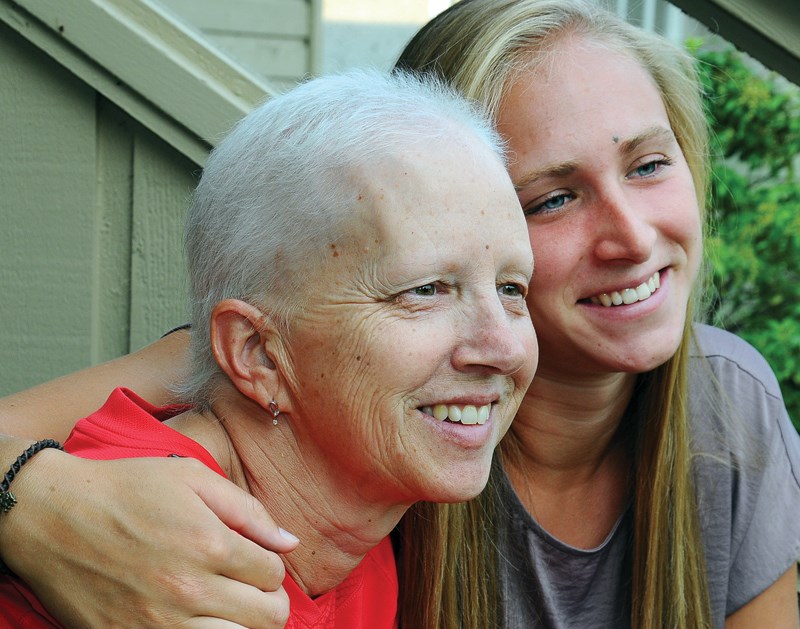Her life changed over a weekend.
Susan Stewart had been the embodiment of North Shore healthy living since she and her husband drove from Ontario to Upper Lonsdale in 1989.
Stewart remembers her three children cheering her on when she ran her first marathon two decades ago. The athletic family ran and biked. The kids played sports like field hockey and soccer while the parents coached.
In late fall 2016 Stewart felt something was wrong. She was nauseous. Her urine had turned dark.
Bloodwork and an ultrasound revealed stage IV pancreatic cancer.
“Literally, I was fine on the Friday and on the Monday I was not,” she says.
The initial diagnosis came in December, turning the family Christmas into a period of limbo, daughter Natalie Stewart recalls.
During the winter of uncertainty the Stewarts drafted a new family motto: Feel the Love.
While statistics can’t tell the whole story, Canadian Cancer Society’s figures show a two per cent survival rate over five years for patients with stage IV pancreatic cancer.
Those figures are exacerbated by the lack of an effective screening test as well as pancreatic cancer’s resistance to chemotherapy, says oncologist Dr. Daniel Renouf with the B.C. Cancer Agency.
However, there’s been a “new revolution in oncology,” in recent years, he says.
That revolution is immunotherapy, a medical technique that alerts an oblivious immune system to invading cancer.
When the first clinical trials in Canada to use immunotherapy drugs like Durvalumab opened up in the past year, Stewart was at the front of the line.
There are no guarantees regarding the effectiveness of treatment.
Stewart, who describes herself as more pioneer than guinea pig, says the decision to enrol in the trial was simple.
“Why not?” she says. “I didn’t really feel like I had anything to lose by giving it a try.”
Stewart’s treatment uses chemotherapy to weaken the cancer and immunotherapy to activate the immune system.
The chemotherapy tends to leave her fatigued, unable to eat or sleep well for at least a day. “And then I start to rally,” she says.
Her tumour has shrunk, she reports.
Two days after chemotherapy, she’s able to walk for an hour. Stewart says after four days, she can usually marshal enough energy for a two-hour hike as she joins “what used to be my running group and (has) now become a walking group.”
They hike and just appreciate their time together, Stewart says.
Friends have shuttled Stewart to appointments and dropped meals off on the family’s front step, Natalie reports.
But while community support has been overwhelming, Natalie wondered if there was anything she and her family could do specifically for pancreatic cancer research.
That changed recently when the family stumbled on the Cypress Challenge. The mountainside cycling trip, now in its 10th year, has raised more than $2 million for pancreatic cancer research.
“My mom just sort of took it and ran with it and got us signed up,” Natalie says. “We’re all pretty game to do it.”
Much like Stewart’s children watched her run her first marathon, she plans to cheer on her husband and children as they climb 12 kilometres from Mulgrave School to the Hollyburn Nordic Area.
There’s a special significance in understanding that the money raised goes directly to programs like the one her mother is in, Natalie noted.
After setting an initial goal of $1,000, the Pioneer Susan team has now raised more than $9,000.
There can be a “vicious cycle” where cancers with low survival rates get little funding, Stewart notes. The event is an opportunity to let people know how deadly pancreatic cancer is and that it doesn’t have to be that way.
“That’s really what I want – is for people to know about it, not to know about me but to know . . . that they need the funding to get those cures happening that are happening with other cancers,” she says.
Stewart’s perspective has changed since the diagnosis, she says. “I do a little less around the house. I try to save my energy for the important things,” she says.
Asked what those important things are, her voice wavers with emotion. “Family,” she replies.
The family motto, Feel the Love, is now stencilled on Stewart’s bedroom wall.
“You certainly learn to appreciate every day,” she says. “It sounds like a cliché ... but you really do.”
For more information or to donate to the cause visit cypresschallenge.com/the-ride/.



